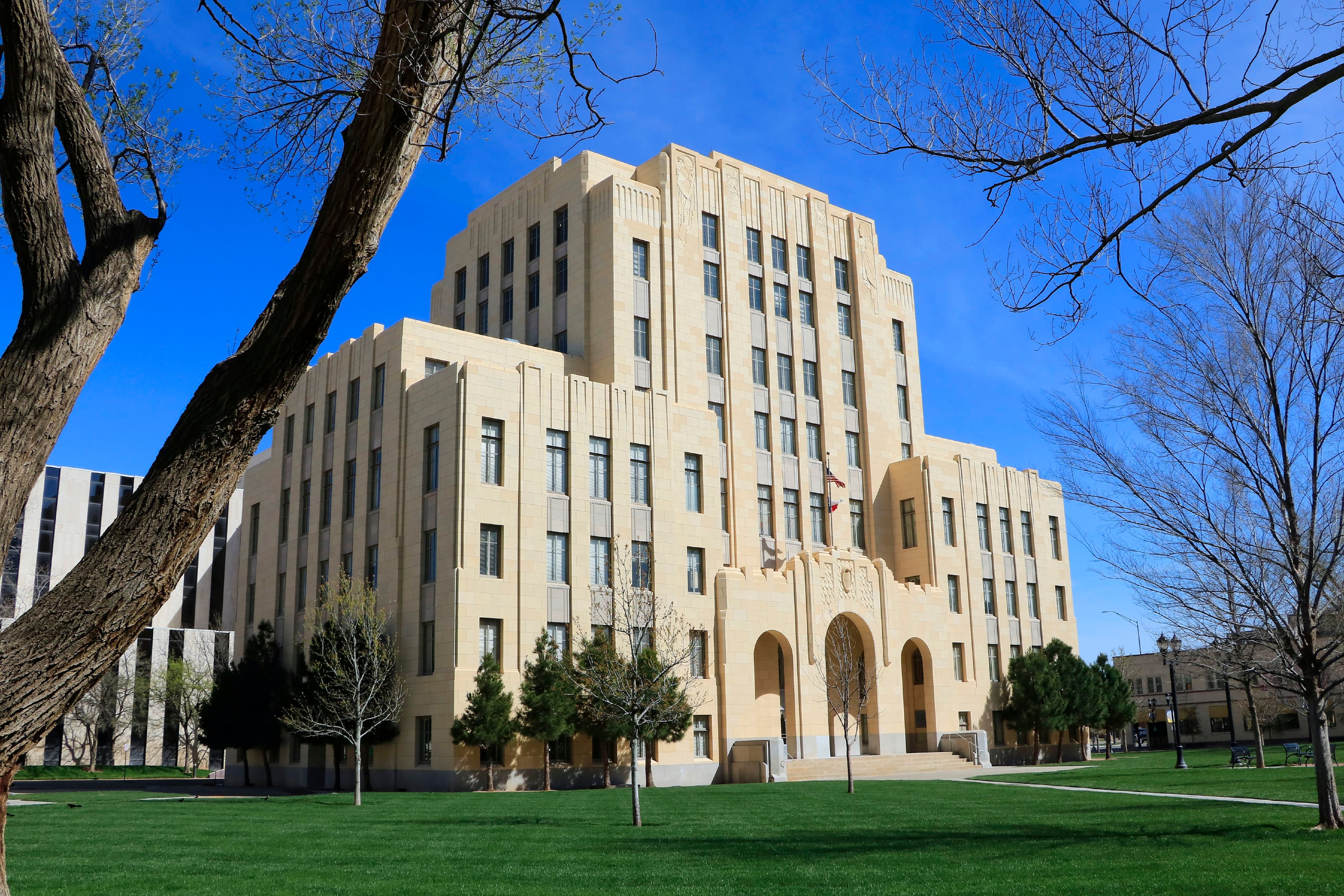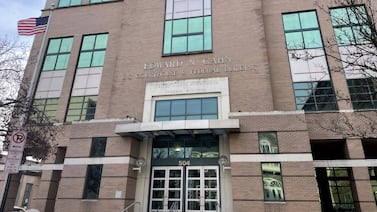Update: The Potter County Republican Party has reversed course and will contract with the county to run the primary election. Read our coverage here.
The Potter County Republican Party plans to conduct its own election during the Texas primary on March 1, independent of the county election administration. People voting in Republican races on Election Day will cast hand-marked ballots that will be hand counted, which the party believes to be more secure. Experts say the move will introduce a higher risk of fraud, confuse voters, and likely result in legal challenges.
“This introduces a lot of potential mistakes and it also introduces opportunities for fraud,” said Christina Adkins, the legal director of the Texas Secretary of State’s elections division. “The candidates on this ballot really need to think about whether this is how they want their election run.”
The plan is the brainchild of county GOP chair Dan Rogers. He said repeatedly that turnout in the county, home to Amarillo, had gone down since the county introduced voting machines and voting centers in 2015. “The more they try to make it easier and add gadgetry, it goes down,” he said. This is false. Historical voting data shows no significant change in county turnout patterns since the introduction of the technology.
The decision comes after an Arizona congressional candidate who participated in the Jan. 6 insurrection gave an “election integrity symposium” to the party in October. The presenter, Jeff Zink, is a candidate for Arizona’s 7th Congressional District who falsely says that the Cyber Ninjas’ investigation report released in September hid rampant fraud about Maricopa County’s 2020 election results. Around 50 people attended the event and listened to Zink expound on the benefits of hand counting.
Zink and his son, Ryan, participated in the Jan. 6 U.S. Capitol insurrection. His son now faces federal criminal charges. Ryan Zink filmed himself and the other rioters entering the Capitol. “We knocked down the gates! We’re storming the Capitol! You can’t stop us!” he said, facing his video camera. “We’re about to bum rush this shit!” Jeff Zink denies that his son was involved and says he was falsely accused. Jeff Zink has spoken at multiple events supporting the insurrectionists as part of his congressional campaign and has repeatedly claimed that voting machines were the source of significant fraud.
Rogers said he “doesn’t know” if the county’s machines are error-ridden or not. The county currently uses Hart InterCivic direct-recording electronic machines that do not produce a paper ballot but will be modified next year to comply with a new Texas law that requires such a printout. He said voters do not trust the technology and would prefer to vote on paper. Asked for survey data to support this claim, he said he didn’t need it, and instead recounted a conversation with his mechanic. “I know my voters,” he said.
On Dec. 3, Rogers sent out an email titled “Potter County (Amarillo) takes the first step toward real election integrity” to Republican Party chairs in every Texas county, encouraging them to copy his plan. “We would like to see other County Committees follow our lead and we will help any County Chair interested in having real secret ballot elections,” he wrote. He has received no interest.
Chris Davis, the election administrator in Williamson County and vice president of the Texas Association of Elections Administrators, learned of Rogers’ plan from an email forwarded by the local party chair. “This will end badly,” Davis said, predicting extreme voter confusion. He said his county party has no desire to move in that direction and he is unaware of any county making a similar decision.
Potter County has nearly 60,000 registered voters and shares its largest city, Amarillo, with neighboring Randall County. Nearly 70 percent of Potter County voters cast their ballots for Donald Trump in 2020.
While neither the state nor the county can stop Rogers from carrying out this plan — the parties are entirely responsible for the conduct of primary elections on Election Day — officials at both levels of government have repeatedly warned Rogers that his move will confuse voters. By state law, the county must manage early voting and vote by mail, which is how local administrators anticipate most county voters will cast their ballots. The county will use voting machines, as required by county statute. Typically a minority of voters do present in person on election day and thus, under Rogers’ plan, would be subject to entirely different rules and would have to report to different voting locations than they have in the past.
While Potter County uses a voting center model — relying on epollbooks and voting machines to allow voters to cast ballots anywhere in the county — Rogers has decided that the party will use only paper pollbooks and that voters must report to their assigned precinct.
Melynn Huntley, the election administrator for the county, said that Rogers may “alienate his own voters” with the plan. “Suddenly, they are going to show up to vote and realize it’s not in the same location,” she said. “Running a quality election is hard for even the most experienced counties.”
The lack of epollbooks also means that election workers will have no means to ensure that individuals who cast a ballot in the Democratic primary are not also casting ballots in the Republican primary. “One of the biggest problems with this is that it’s throwing the doors wide open to voter fraud,” said Huntley, an assertion Adkins agreed with.
Rogers acknowledged he would not be able to check for double voting but said he doesn’t believe anyone will try. “They’d be charged with a felony,” he said. He acknowledged there would be no way to remove these individuals’ votes from the total count after election day. “I trust people,” he told me. “You are the one that doesn’t trust people.”
Multiple studies have shown that hand counting ballots leads to higher rates of inaccuracy than ballots counted by scanners or other machines. Rogers rejected this, saying hand recounts would be “100 percent accurate.”
“I don’t need studies. They are a waste of money,” he said. “Any time you count anything you have two people counting. I do this when I’m dealing with my cattle – we have two cowboys, and they better come up with the same number.”
Rogers said that he believes the hand counting will take “around 30 minutes,” despite there being more than two dozen races on the March ballot. He offered no basis for his calculation. In 2020, a recount of a single race in Potter County took several dozen poll workers 8 hours to count, said Huntley. Rogers said he’d arrived at the estimate using “logic.”
Ryan Macias, a Dallas-based elections consultant who has overseen or assisted with recounts nationwide, said the 30 minute estimate was not at all logical. Individuals counting votes go down the ballot in pairs, checking each other’s interpretation of the ballot while making hand tallies on a separate sheet, typically race by race. “It takes a long time,” he said. “Look at what just happened in the state of Arizona. It took twice as long as they thought to count only two races and the cost was astronomically higher than they originally envisioned.”
Federal law requires every polling location in a federal election, of which 2022 is one, to have an ADA-compliant voting machine on hand for disabled voters who prefer to vote on a machine. Rogers said this wasn’t necessary. “All the handicapped people I know prefer paper and they’ve told me that,” he said. “We’ll change the law.”
Even in non-federal elections, Texas law requires that polling locations have such machines. “We’ll change state law too,” he said. (The Texas Legislature will not be in session prior to the March primary.)
Under Texas’s new voting law, passed this year, election administrators and party chairs can be held personally liable for violations of Texas’s Elections Code. While the county party is allowed to hold the election in the manner that its leaders choose, Rogers must ensure that any changes follow the code exactly. In addition to loss of their jobs, those found to be in violation of the law would be fined $1,000 per violation.
Adkins said that she is concerned that Rogers’ decision will open the county party up to risk of litigation. “If you have close races or contested races and there is a problem, be it fraud or human error, they are the ones that will bear that risk and responsibility,” she said. “I want to make sure they are going into this with their eyes wide open.”
Rogers was not deterred. “Bring it on,” he said.




